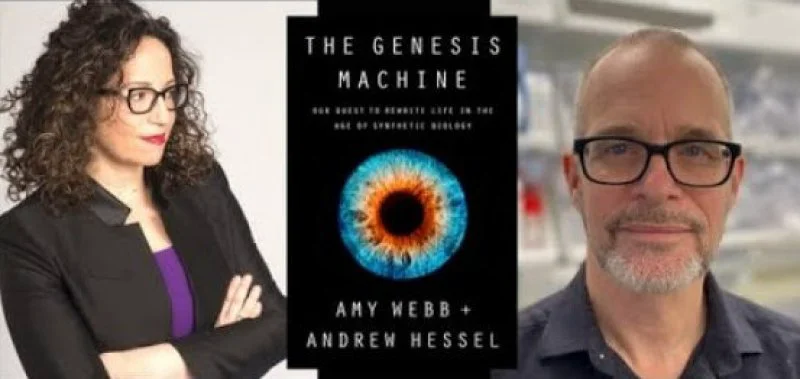‘The Genesis Machine’: Examining the future shift away from traditional farming products to lab produced foods
‘The Genesis Machine’: Examining the future shift away from traditional farming products to lab produced foods


From domestication and selective breeding to synthetic insulin and CRISPR, humanity has long sought understand, master and exploit the genetic coding of the natural world. In The Genesis Machine: Our Quest to Rewrite Life in the Age of Synthetic Biology authors [Amy Webb and Andrew Hessel] examine today’s state of the art and imagine what a future might look like where life itself can be manufactured molecularly.
It’s plausible that by the year 2040, many societies will think it’s immoral to eat traditionally produced meat and dairy products. Some luminaries have long believed this was inevitable. In his essay “Fifty Years Hence,” published in 1931, Winston Churchill argued, “We shall escape the absurdity of growing a whole chicken in order to eat the breast or wing, by growing these parts separately under a suitable medium.”
…
Lab-grown meat remains expensive today, but the costs are expected to continue to drop as the technology matures. Until they do, some companies are creating hybrid animal-plant proteins.
Startups in the United Kingdom are developing blended pork products, including bacon created from 70 percent cultured pork cells mixed with plant proteins.
Even Kentucky Fried Chicken is exploring the feasibility of selling hybrid chicken nuggets, which would consist of 20 percent cultured chicken cells and 80 percent plants.
This is an excerpt. Read the original post here.

 | Videos | More... |

Video: Nuclear energy will destroy us? Global warming is an existential threat? Chemicals are massacring bees? Donate to the Green Industrial Complex!
 | Bees & Pollinators | More... |

GLP podcast: Science journalism is a mess. Here’s how to fix it

Mosquito massacre: Can we safely tackle malaria with a CRISPR gene drive?

Are we facing an ‘Insect Apocalypse’ caused by ‘intensive, industrial’ farming and agricultural chemicals? The media say yes; Science says ‘no’
 | Infographics | More... |

Infographic: Global regulatory and health research agencies on whether glyphosate causes cancer
 | GMO FAQs | More... |

Why is there controversy over GMO foods but not GMO drugs?

How are GMOs labeled around the world?

How does genetic engineering differ from conventional breeding?
 | GLP Profiles | More... |

Alex Jones: Right-wing conspiracy theorist stokes fear of GMOs, pesticides to sell ‘health supplements’




 Viewpoint — Fact checking MAHA mythmakers: How wellness influencers and RFK, Jr. undermine American science and health
Viewpoint — Fact checking MAHA mythmakers: How wellness influencers and RFK, Jr. undermine American science and health Viewpoint: Video — Big Solar is gobbling up productive agricultural land and hurting farmers yet providing little energy or sustainabilty gains
Viewpoint: Video — Big Solar is gobbling up productive agricultural land and hurting farmers yet providing little energy or sustainabilty gains Trust issues: What happens when therapists use ChatGPT?
Trust issues: What happens when therapists use ChatGPT? Fighting deforestation with CO2: Biotechnology breakthrough creates sustainable palm oil alternative for cosmetics
Fighting deforestation with CO2: Biotechnology breakthrough creates sustainable palm oil alternative for cosmetics California, Washington, Oregon forge immunization alliance to safeguard vaccine access against federal undermining
California, Washington, Oregon forge immunization alliance to safeguard vaccine access against federal undermining 30-year-old tomato line shows genetic resistance to devastating virus
30-year-old tomato line shows genetic resistance to devastating virus The free-range chicken dilemma: Better for birds, but with substantial costs
The free-range chicken dilemma: Better for birds, but with substantial costs ‘You have to treat the brain first’: Rethinking chronic pain with Sanjay Gupta
‘You have to treat the brain first’: Rethinking chronic pain with Sanjay Gupta
